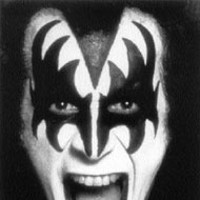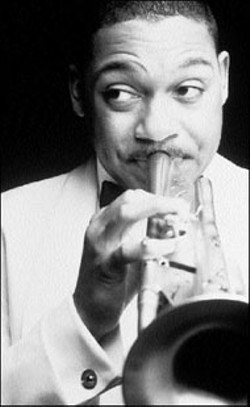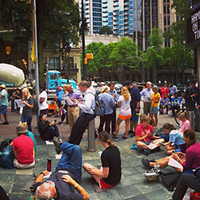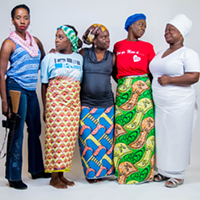After the super-hyped apprenticeship with Blakey, Marsalis ventured out on his own. His career went into hyperdrive. Grammy Awards for best-selling jazz and classical albums. Critical admiration in every field he conquered commercially. Compelling excavations into the roots and prime repertoire of jazz. Controversial, uncompromising interviews.
We hadn't seen or heard anything yet. Marsalis spearheaded jazz programming at Lincoln Center and established the Lincoln Center Jazz Orchestra. He created groundbreaking pieces in long-form for septet, and for orchestra; and his crossover oratorio, Blood on the Fields, earned him the first Pulitzer Prize ever awarded to a jazz composer. Then he made his landmark appearance earlier this year in Ken Burns's monumental Jazz documentary, sparking new interest in jazz and a boom in album sales.
Yesterday is gone. On October 18, Wynton Marsalis turned 40. But with all his achievements and accolades, his zest for bringing jazz to the people, hipping new generations to the music, is as strong as ever.
Creative Loafing: You're going to be in Charlotte with your septet in about a week. Are you featuring new personnel or new compositions?
Wynton Marsalis: We have a new composition for the ballet we've been working on with Alvin Ailey. We'll be playing some of that, and we're playing just a lot of our regular septet music. It's a wide range of music, as always a lot of my original compositions. We have Richard Johnson on the piano, and Harvey Jackson on the drums, and Ronald Westray on the trombone. So that's new, different personnel.
To me, the septet sound sums up a lot of your outlook and your talent, because you've restored the balance between brass and reeds, and you've kind of created a mini-orchestra with three sections.
Oh man, thank you. That's what we're trying to do with the septet just bring things about the music to the forefront. Make the music be more of itself. In the New Orleans music, getting a call-and-response between the brass and the reeds, and also in some places to take the long solos and have the freedom for the drums to interact, which you don't necessarily have with a big band.
You've also resurrected the good righteous dirty sound of the slide trombone, which has been missing from jazz for a couple of decades.
Yeah. Oooo, I love that.
And you also ask your reed players to pack a clarinet so you can do that New Orleans sound.
Yes, sir. I was lucky to have people who didn't mind playing it.
Tell me about the new facility you're building for the Lincoln Center Jazz Orchestra.
We're building the Frederick P. Rose Hall in Columbus Circle in the AOL Time-Warner Building. [Four] thousand square feet. It's three halls, three rehearsal rooms, a studio, a master control, technical operations center, and like a jazz cafe, a medium size type of Greek community theater with public dance capabilities. And in the back, kind of a small Italian opera house.
I've read that you want this acoustically to be specifically for jazz. What does that entail?
The tail of the echo is not so long that it makes the bass and the cymbals sound muddy.
Ah...
It has a golden ring in the sound.
Is that what you'd normally hear more of in a studio?
You hear it mainly in a club because a club is generally low ceilings and carpet, so that makes not too much echo. The studios of today, there's no echo, but there's also no quality of the sound a lot of times. Because many of the studios work only with electronic instruments. So they don't really need any of the acoustic instrument sound.
Are you feeling some of the crisis that's being reported in the classical music industry the collapse of quality recording into commercialism?
Aw, definitely.
What do feel the answer is?
You've got to keep playing and deal with education.
Well, in classical music, there's plenty of that, isn't there?
You know, it's not a matter of a certain type of music. It's just the whole direction our entire culture is going in. A lot of times the music is not worth playing because you want that extreme popularity. You have to try to make the statement you can make and try to bring more people over to the statement but realize that the statement is what brings the people. It's not the publicity. The statement. Because when you have a statement that's provocative enough, people want to write about it, and they want to hear it. And when we start to develop the feeling that "people don't know" or they "can't understand" the music and all of that, that hurts what you're trying to do.
Speaking of Sounds.html
-
Best of Jazz 2001
Jan 5, 2002 -

Best Of 2001
Dec 29, 2001 -

Kiss And Tell
Dec 19, 2001 - More »
Latest in Vibes
More by Perry Tannenbaum
-
The Man, The Myth -- Renelvis
-
Good Eats
Our critics' guide to recommended restaurants in Charlotte
-
Good Eats
Our critics' guide to recommended restaurants in Charlotte












